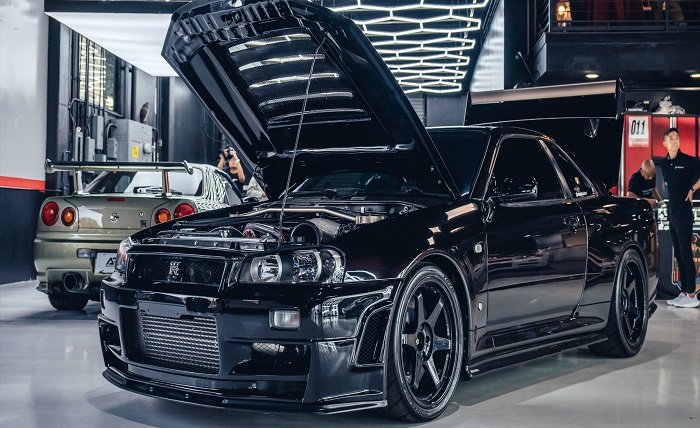Nissan R34: The Iconic Skyline That Shaped the World of Performance Cars

The Nissan R34 Skyline is one of the most revered performance cars in automotive history. Launched in 1999, this iconic car quickly gained popularity among car enthusiasts, becoming a symbol of speed, power, and Japanese engineering excellence. Whether you’re a fan of motorsport, drifting, or high-performance vehicles, the Nissan R34 remains a model that continues to capture imaginations worldwide.
The R34 Skyline was part of the long-running Skyline series, with the R34 being the final iteration before Nissan shifted the Skyline line’s focus in later years. But what makes the Nissan R34 so special? In this article, we’ll explore its history, design, performance features, and the lasting impact it had on the automotive world.
The Evolution of the Nissan Skyline to the R34
Before we dive into the specifics of the Nissan r34 , it’s important to understand its place within the larger context of the Skyline family. The Skyline series, first introduced by Nissan in 1957, has undergone several changes over the decades. The R34 Skyline, produced between 1999 and 2002, was part of the fifth generation of the series, following the R33 and R32 models.
What set the Nissan R34 apart from its predecessors was its refined styling, advanced technology, and powerful performance. As the flagship of the Skyline range, the R34 incorporated lessons learned from earlier models, offering a better driving experience, improved handling, and more technology. It is often hailed as the pinnacle of the Skyline series before the brand moved away from the R34’s distinct design and powertrain.
Design and Styling of the Nissan R34
The design of the Nissan R34 is both aggressive and functional, with a focus on aerodynamics and performance. One of the key elements that define the R34’s aesthetic is its wide stance, low profile, and aerodynamic bodywork. The car features sharp lines, a sculpted front bumper, and wide fenders that house its beefy wheels, giving the car a muscular and purposeful appearance.
The R34’s interior is also focused on driving performance, with a cockpit-style layout that places the driver in the center of the action. The dashboard includes a comprehensive set of gauges and dials, allowing the driver to monitor the car’s vital statistics such as oil pressure, temperature, and boost levels. Additionally, the Nissan R34 introduced the world to a multi-function display (MFD) located at the center of the dashboard, providing real-time data on engine performance and a host of other important metrics.
Engine and Performance of the Nissan R34
The Nissan R34 was powered by the legendary RB26DETT engine, a 2.6-liter twin-turbocharged inline-six engine that produced 280 horsepower and 392 Nm (289 lb-ft) of torque. This engine was a marvel of engineering, capable of handling high levels of boost and tuning potential, making it a favorite among car enthusiasts and tuners worldwide.
In stock form, the Nissan R34 could accelerate from 0 to 60 mph in just 5.4 seconds, with a top speed of around 156 mph. However, many owners and tuners would push the limits of this engine, extracting much higher power outputs through modifications. Thanks to its robust engine and well-balanced chassis, the R34 was capable of exceptional performance both on the street and on the racetrack.
Its advanced all-wheel-drive (AWD) system, known as ATTESA E-TS, and the sophisticated Super-HICAS four-wheel steering system helped to provide precise handling and agility. These features, combined with the car’s lightweight body, made the Nissan R34 a truly exhilarating driving experience.
Nissan R34’s Iconic Place in Motorsport
The Nissan R34 Skyline became widely known in motorsport, especially in the world of drifting and racing. The car’s advanced drivetrain, strong engine, and balanced handling made it an excellent platform for competition. In the world of drifting, the R34 found fame in the hands of talented drivers like Keiichi Tsuchiya, also known as the “Drift King,” who used the car in the famous Japanese D1 Grand Prix series.
Moreover, the Nissan R34 achieved notable success in circuit racing, including the prestigious 24 Hours of Le Mans, where it competed against the best of the best. The car’s performance in these arenas solidified its reputation as a high-performance machine that could hold its own against some of the world’s best cars.
The Nissan R34’s Impact on Car Culture
Beyond its technical specifications and racing success, the Nissan R34 also had a significant impact on car culture. With its distinctive design, raw performance, and extensive tunability, the Nissan R34 quickly became a symbol for enthusiasts and street racing fans. It was featured in the hit movie franchise “The Fast and the Furious,” where Paul Walker’s character, Brian O’Conner, famously drove a modified R34. This pop culture moment further cemented the car’s legendary status.
Moreover, the R34 Skyline became a favorite among the tuning community, who saw the car’s potential for modification. From aftermarket turbos and exhausts to performance chips and suspension upgrades, the Nissan R34 offered an almost endless array of customization options that allowed owners to personalize their cars to an extreme degree.
Nissan R34’s Legacy in the Automotive World
Even though production of the Nissan R34 ended in 2002, its legacy continues to resonate in the automotive world. The R34 set the bar for what a high-performance Japanese sports car could be, influencing both Nissan’s future models and competitors. Its powerful engine, exceptional handling, and innovative features have become benchmarks for subsequent generations of sports cars.
Additionally, the R34 has remained a collectible item, with pristine examples commanding impressive prices in the used car market. Classic car enthusiasts, collectors, and investors continue to seek out this iconic vehicle, contributing to its ongoing popularity. The Nissan R34 has earned its place as one of the most influential cars of the 1990s and early 2000s.
Modern-Day Modifications and Tuning for the Nissan R34
Despite being over two decades old, the Nissan R34 remains a popular choice for tuning and modification. Many enthusiasts still take the car to aftermarket specialists to enhance performance, improve handling, and even restore the car to showroom condition. The wide range of available parts and modifications allows for substantial customization, and the R34 has become a favorite for those looking to create a unique, one-of-a-kind performance machine.
Upgrades like bigger turbochargers, performance intercoolers, and custom exhaust systems are common among R34 owners, while others focus on aesthetics, upgrading the car’s body kit, wheels, or interior features. The tuning scene around the Nissan R34 is as vibrant as ever, ensuring that this car will remain a cornerstone of car culture for years to come.
The Nissan R34 and Its Growing Popularity in the Used Car Market
The Nissan R34’s status as a collectible and performance car has made it a sought-after vehicle in the used car market. While the car was not officially sold in many countries outside Japan due to strict import laws, the R34’s appeal has grown significantly, and many have been imported into places like the United States, where enthusiasts are eager to get their hands on this Japanese icon.
As time passes, the R34 continues to appreciate in value, particularly for well-maintained examples with low mileage. Some rare versions, such as the R34 GT-R, fetch significant sums at auctions, with prices rising as demand for these classic cars increases.
The Future of the Nissan R34: A Timeless Classic
Despite the rapid advancement of automotive technology, the Nissan R34 remains relevant and highly respected in the performance car world. Its blend of raw power, tunability, and historical significance ensures its place as one of the most iconic vehicles of its generation. While modern cars may offer more advanced features and higher performance levels, the Nissan R34’s legacy will continue to inspire both car enthusiasts and collectors alike.
As long as there are fans of high-performance vehicles and Japanese engineering, the Nissan R34 will remain a symbol of automotive excellence and a timeless classic.
Conclusion
The Nissan R34 Skyline is more than just a car—it is a piece of automotive history. With its legendary engine, unmatched performance, and lasting impact on motorsport and car culture, the Nissan R34 remains one of the most iconic vehicles ever produced. From its racing success to its role in shaping car culture, this legendary machine continues to capture the hearts of car enthusiasts worldwide.
For those fortunate enough to own an R34, or those dreaming of one day driving this iconic vehicle, the Nissan R34 will always represent the pinnacle of Japanese engineering and high-performance driving.
FAQs
- What makes the Nissan R34 so special?
The Nissan R34 is revered for its powerful RB26DETT engine, advanced technology, and exceptional performance, making it a sought-after car among enthusiasts. - What is the price of a Nissan R34 today?
Prices for a Nissan R34 can vary widely depending on the model and condition, with the GT-R variants fetching high prices due to their rarity and demand. - Can I modify a Nissan R34?
Yes, the Nissan R34 is highly tunable, with many aftermarket parts available for engine upgrades, suspension enhancements, and aesthetic modifications. - Why is the Nissan R34 so popular in car culture?
The R34 gained widespread recognition through films like The Fast and the Furious and is celebrated for its performance, design, and tuning potential. - Is the Nissan R34 still in production?
No, the Nissan R34 was discontinued in 2002, but it remains an iconic vehicle, still in demand among collectors and enthusiasts today.




